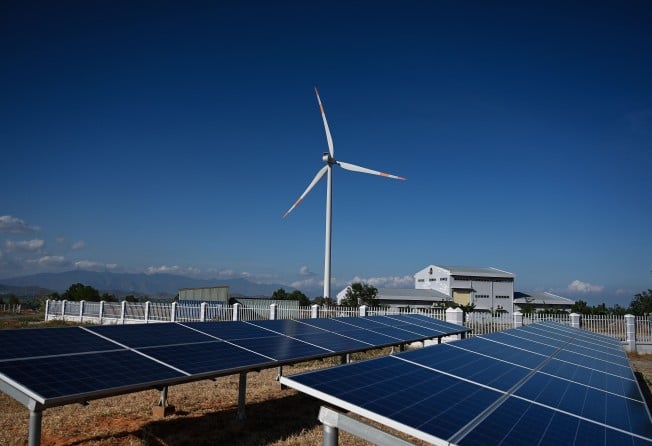US-China trade war and climate of protectionism are holding back needed investment in renewable energy
- Trade wars, tariffs and mutual suspicion are impacting global investments in the power sector, at a time when the world is racing to reduce carbon emissions to keep global warming to within 1.5 degrees Celsius

Whether in Beijing or Washington, the continued reminders of global warming make it vital to decarbonise our economies and move to renewable energy. But, just as we are making great strides in building a strong renewables sector, our progress is being threatened by trade wars.
The world’s energy system is at a critical point. The difference between an increase in global warming of 1.5 and 2 degrees Celsius (34.7 and 35.6 degrees Fahrenheit) by 2050 is equivalent to hundreds of millions more lives exposed to poverty, extreme heat, drought and mortal risks. Wind power and other renewables will need to supply 70-85 per cent of the world’s electricity by 2050 to avoid these worst-case scenarios, according to the Intergovernmental Panel on Climate Change (IPCC).
To achieve the 1.5-degree target, the IPCC has called for an unprecedented scaling-up of global energy investment, with investment in renewable energy to increase annually to US$2.4 trillion through to 2035.
A trade war which slows economic growth and erects barriers to investment not only hurts the business of clean energy, it also handicaps the global effort to preserve our planet.
China and the US are positioned to lead the global charge to install onshore wind power over the next five years. According to the Global Wind Energy Council, both countries will install almost half of the 330 gigawatts of new wind power capacity worldwide by 2023.
This is good news: renewables like wind and solar power can dramatically reduce – by as much as 50 per cent – the carbon dioxide emissions from electricity generation by 2030. But tariff battles between the world’s two largest economies are hindering the deployment of these technologies.
The United States has raised tariffs on steel and aluminium, which make up around 90 per cent of wind turbines, and plans to impose duties on components like generators and gear boxes from China.
It may yet expand tariffs on wind towers from China to other countries like Canada, Indonesia, South Korea and Vietnam.
These actions are exerting price pressure on the US wind supply chain. The chief executive of the American Wind Energy Association has noted that project costs in the US could increase by as much as 10 per cent due to tariffs, endangering up to a quarter of future projects.
Trade wars do real damage by inflating prices across the value chain, hurting businesses and consumers. And when tariffs adversely affect new technologies like renewable energy, consumers and investors have fewer incentives to divest from fossil fuels.
A reprieve in the US-China trade war was attained last week, but tariff hikes still remain scheduled for December. Should the global tug of war continue, this will trigger further turbulence in financial markets, disruption to supply chains and restrictions to the growth of renewable power.
The rapid proliferation and increasing cost-competitiveness of renewables now provide powerful commercial incentives to invest in the energy transition. Since 2014, according to BloombergNEF, the levelised cost of energy (that is, lifetime costs divided by energy production) for onshore wind has declined by almost 40 per cent – and by almost 60 per cent for offshore wind.
But a climate of protectionism and mutual suspicion has led to restrictions on global investment in the power sector and in its most important growth technology, renewables, just at a time when greater and more agile investment flows are needed.
In China, a lack of transparency in procurement has led to foreign companies being excluded from large renewable energy contracts, even when their technology is both suitable and cost-competitive.
China’s fast-growing offshore wind sector needs to adopt international standards in terms of access to critical data, and tenders with a level playing field, if it wants to achieve the rapid cost reductions that Europe and other markets have achieved.
In the West, Chinese investments in power companies have been rejected by the US Committee on Foreign Investment (CFIUS). A recent initiative to introduce EU-wide foreign investment screening has already had an impact on mergers in Europe’s renewables sector.
Renewable-related disputes at the World Trade Organisation have also been brought against the US, China, the European Union, South Korea, Canada, Vietnam, Malaysia and India over the past decade.
Successfully carrying out the energy transition will require fair and open investment environments that allow capital to be deployed effectively where needed, and for the best technologies to be harnessed without unfair preferences for local companies or vested interests.
Investment restrictions on renewable energy are bad for the economy, bad for consumers and bad for the planet, and they will only compound the damage of climate change. We need to work collectively towards a more sustainable future, powered by renewable energy.
Morten Dyrholm is chairman of the Global Wind Energy Council (GWEC) and group senior vice-president of Vestas Wind Systems, a leading company in wind energy solutions